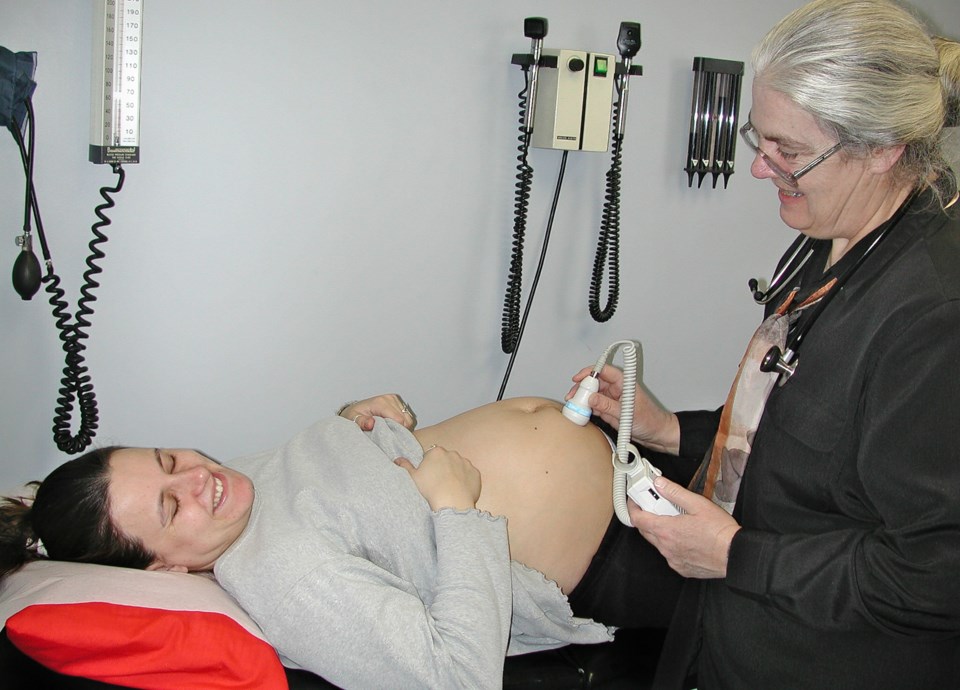A local family doctor says she's "tickled pink" after being recognized for her contributions to the community and Royal Victoria Regional Health Centre (RVH).
The first Laura E. Crook Scholarship for Community Health Research will be awarded to a post-secondary student this spring.
The scholarship speaks directly to Dr. Laura Crook’s life-long interest and her work. She is now retired from a 37-year medical practice as a family physician.
After she retired, in 2006, she continued to be involved in RVH and served on the Barrie hospital’s research ethics board until 2020. She has maintained an interest in women’s health and obstetrics throughout her life.
Her contributions are many — both through work and volunteer efforts — but local families will know her for delivering their children, more than 3,000 babies, throughout her career.
Crook credits her family doctor for sparking her interest in medicine.
“My family doctor when I was a child growing up was female, which was less common in those days — back in the ‘40s — and she was wonderful,” Crook says. “I thought I'd like to do that and it stayed with me.”
Born in Cambridge, England, Crook’s interest in women's health extended into obstetrics when she was training at the University College Hospital Medical School. She considers herself fortunate to be accepted into the school because of its reputation for evidence-based learning.
“In those days, you try to practise what has been shown to be the best way to do things by research,” Crook says.
With medical advancements, it also means life-long learning.
“When I think back over my lifetime when I was a little girl, penicillin was developed, became available during the Second World War and was first used by American troops,” she says, citing one of many changes that occurred during her medical career.
More recently, during the pandemic, the development of vaccines, based on Messenger RNA (mRNA), is another example of research impacting medical change.
“I remember it being evident in the ‘60s. It gives you a bit of idea from early antibiotics to the description of DNA that revolutionized medicine and drugs,” Crook says. “Now we manipulate DNA, RNA, and protein and things. It's a phenomenal change. It really is a whole new world.”
Her interest in medical research and her active engagement in it at the community level was part of the inspiration behind the new scholarship. She hopes it will encourage students to become involved in community-based research which may impact patient care in the future.
During her time at RVH, serving as chief of obstetrics and after retirement as clinical director of RVH's Women's Health Program, Crook helped to establish new services, such as the hospital's midwifery program, obstetrical triage unit, as well as expanding services for children.
While most of Crook’s volunteer work was related to women's health, she also became involved in local organizations such as the Children’s Aid Society, now referred to as Simcoe Muskoka Family Connexions, and initiatives geared to children. She worked with a group of local women to establish a prenatal walk-in clinic aimed at reducing the infant death rate in the community. They responded to a request from the Ministry of Health and Barrie was selected to be one of two clinics in Ontario.
Growing up in England, her father was a scientist. She met her late husband, Dr. Nabil El-Maraghi, when she was finishing her training. Originally from Egypt, he was in London as a post-graduate student.
The couple came to Canada in search of more opportunities and established their family practice here in the mid-1980s.
The idea to settle in Barrie came from a colleague at medical school.
She has two grown sons and one grandchild. Both of her sons became doctors, but only one is a medical doctor, Dr. Rob El-Maraghi, who lives in Barrie and works at RVH as an oncologist.
Crook has been riding out the pandemic at her family cottage near Parry Sound, but says she continues to stop by her Barrie home from time to time to water the plants and visit family. While her mobility is a little less these days, she enjoys music, opera, reading fiction, non-fiction, and “Netflixing."
“It’s old-age stuff — just the way it is. My mother had similar issues,” Crook says of her reduced mobility. “Fortunately, as I say to people, my head is mostly working... so it means it can always amuse myself.”
She also likes to travel and is hoping to do an Alaska cruise by the end of this year with a close friend from Australia. The trip has been on hold for the past two years since the start of the pandemic.



